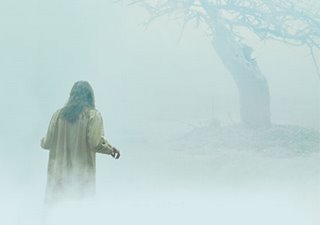
It would appear the Americans won’t be happy until God himself appears astride a beam of divine light, wrapped in Old Glory and swearing on his autobiography, to testify against Satan and Charles Darwin and Michael Moore and Harry Potter and anyone else, real or unreal, who doesn’t fit with their increasingly monochromatic notions of what constitutes right and wrong. As right-wing and reactionary as it’s possible to be without being composed of aborted stem cells, the daft horror The Exorcism of Emily Rose, directed by Scott Derrickson from a script he wrote with Paul Harris Boardman, is a bewilderingly empirical discussion about the existence of cosmic good guys and bad guys wrapped in a shabby splatter movie, itself stapled to a moribund and seemingly eternal courtroom drama.
An understandably worried-looking Catholic priest (played by Tom Wilkinson) is accused of manslaughter because a devout young student (Jennifer Carpenter), who believed herself to be possessed by demons, has died after a failed exorcism ritual. Appearing for the defence is Laura Linney, playing the ambitious lawyer Erin Bruner, all trendy atheism, sharp tailoring and minimalist furnishings. For the state, subtlety grey and moustachioed, is the patrician Campbell Scott, whose efforts to imprison the priest for negligently denying her medication, become increasingly strained. “Your honour, I object!” he shouts in true courtroom-drama lawyer style. On what grounds? “Well, silliness, for one.”
Sustained.
Based on a true story, in the same way as The Cat In The Hat might have a real-life counterpart somewhere licking it’s own arse in a jaunty beret, the film employs a succession of cross-genre techniques to try and have it’s audience accept as real the supernatural, specially-effected events it depicts. Never for a moment just another spooky November release, Emily Rose posits itself as being a matter of (eternal) life or death, a frothing evangelical tract rejecting science and championing faith through well-timed lightning storms, cawing ravens, black cats and hooded devils.
We know from the first scene that the stigmata-carrying martyr Emily didn’t survive the experience; that the priest (astonishingly, neither Irish nor alcoholic) is in jug and that the defence is having trouble believing there is a celestial battle being waged in the battered body of a theology student. It is left to Laura Linney to carry the story, and while her grace and intelligence are occasionally well served, she can do nothing about the pre-ordained direction the film takes. Presenting itself as a debate, it is anything but. As a horror movie, it has its moments. As a courtroom drama, it is especially dull. But as propaganda bedecked in the familiar raiments of popular entertainment, in the days of powerful politicians on missions from God and ‘intelligent design’, Emily Rose is priceless.








1 comment:
Ha, ha. Your post is also priceless!
Post a Comment